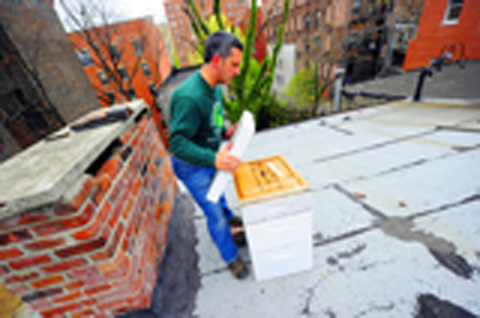Urban farming is a growth industry in New York city’s concrete jungle, and with little open land, agriculturalists and beekeepers have taken to the rooftops to pursue their passion.
Andrew Cote uses the emergency fire ladder to climb up to the roof of his East Village building, where he tends to 250 bee hives.
Cote, a professor of Japanese literature, doubles up as president of the New York City Beekeepers Association, and is happy that the city authorized beekeeping in the middle of last month after an 11-year ban.

PHOTO: AFP
“The city wants to plant 1 million trees, and the trees need to be pollinated,” Cote said.
The ban forced beekeepers into hiding, fearing a US$2,000 fine if caught. Now Cote believes the bees are vital to helping keep the city green.
“Our bees pollinate, and they clean the air. It is a way to connect with nature,” he said.
Bees also produce about 45kg of honey per hive per year, he said — honey that he sells at the city’s various farmer’s markets.
Cote said he has received several requests to install rooftop beehives, and the demand is such that yesterday he was scheduled to offer a course for aspiring apiculturalists.
On the other side of Manhattan, in the posh Upper East Side, Eli Zabar, owner of the upscale “Vinegar Factory” delicatessen, inspects the crops he is growing on the roof of the old factory bought in 1991.
“I began the green houses 15 years ago,” Zabar said. “I grow heirloom tomatoes, lots of different kinds of lettuce, herbs, basil, rosemary, thyme, raspberries, figs, beets. We use the heat of the bakeries and pastries, we recycle the heat. With the use of the heat we have eliminated our [carbon] footprint.”
“You harvest in the morning, you sell in the afternoon, you don’t refrigerate, it tastes better,” Zabar said. “We pick everything ripe and ready to eat. All our products here are organic.”
Depending on the time of day, Zabar says with a smile, “the green houses smell of bread, brownie or croissant.”
About half of the items Zabar sells in his deli comes from rooftop farms.
From Manhattan to Brooklyn, whether on rooftops, backyards or in any of the city’s 600 community gardens, urban farming is a growing phenomenon.
The movement is helped along by Mayor Michael Bloomberg, who seeks to turn the city into a sustainable development champion. Through “PlaNYC 2030,” a program he launched on Earth Day 2007, people who install “green roofs” can get a tax break.
At Randall’s Island, in New York’s East River, the city’s Parks and Recreation Department is currently testing 16 different types of vegetation that could be placed on the roofs of schools, hospitals or other public buildings.
“These are patches of succulent vegetation, like sedum, which protect the roofs, [and] isolate the buildings from the heat because the UV [ultra-violet] sun is not hitting,” senior project manager John Robilotti said.

ECONOMIC WORRIES: The ruling PAP faces voters amid concerns that the city-state faces the possibility of a recession and job losses amid Washington’s tariffs Singapore yesterday finalized contestants for its general election on Saturday next week, with the ruling People’s Action Party (PAP) fielding 32 new candidates in the biggest refresh of the party that has ruled the city-state since independence in 1965. The move follows a pledge by Singaporean Prime Minister Lawrence Wong (黃循財), who took office last year and assumed the PAP leadership, to “bring in new blood, new ideas and new energy” to steer the country of 6 million people. His latest shake-up beats that of predecessors Lee Hsien Loong (李顯龍) and Goh Chok Tong (吳作棟), who replaced 24 and 11 politicians respectively

Archeologists in Peru on Thursday said they found the 5,000-year-old remains of a noblewoman at the sacred city of Caral, revealing the important role played by women in the oldest center of civilization in the Americas. “What has been discovered corresponds to a woman who apparently had elevated status, an elite woman,” archeologist David Palomino said. The mummy was found in Aspero, a sacred site within the city of Caral that was a garbage dump for more than 30 years until becoming an archeological site in the 1990s. Palomino said the carefully preserved remains, dating to 3,000BC, contained skin, part of the

Russian hackers last year targeted a Dutch public facility in the first such an attack on the lowlands country’s infrastructure, its military intelligence services said on Monday. The Netherlands remained an “interesting target country” for Moscow due to its ongoing support for Ukraine, its Hague-based international organizations, high-tech industries and harbors such as Rotterdam, the Dutch Military Intelligence and Security Service (MIVD) said in its yearly report. Last year, the MIVD “saw a Russian hacker group carry out a cyberattack against the digital control system of a public facility in the Netherlands,” MIVD Director Vice Admiral Peter Reesink said in the 52-page

‘WATER WARFARE’: A Pakistani official called India’s suspension of a 65-year-old treaty on the sharing of waters from the Indus River ‘a cowardly, illegal move’ Pakistan yesterday canceled visas for Indian nationals, closed its airspace for all Indian-owned or operated airlines, and suspended all trade with India, including to and from any third country. The retaliatory measures follow India’s decision to suspend visas for Pakistani nationals in the aftermath of a deadly attack by shooters in Kashmir that killed 26 people, mostly tourists. The rare attack on civilians shocked and outraged India and prompted calls for action against their country’s archenemy, Pakistan. New Delhi did not publicly produce evidence connecting the attack to its neighbor, but said it had “cross-border” links to Pakistan. Pakistan denied any connection to